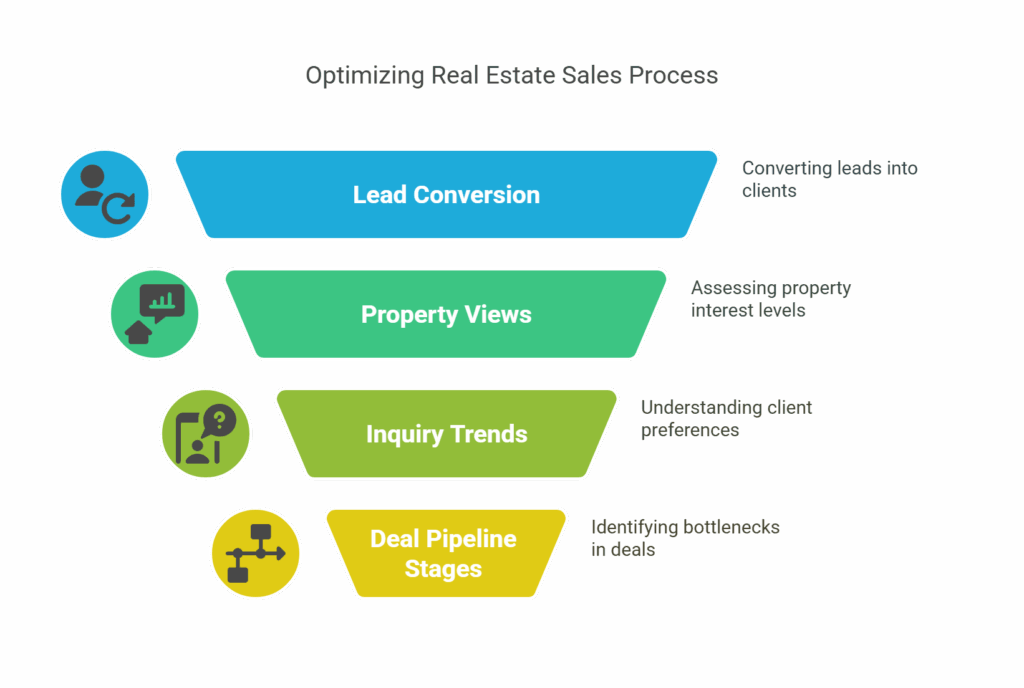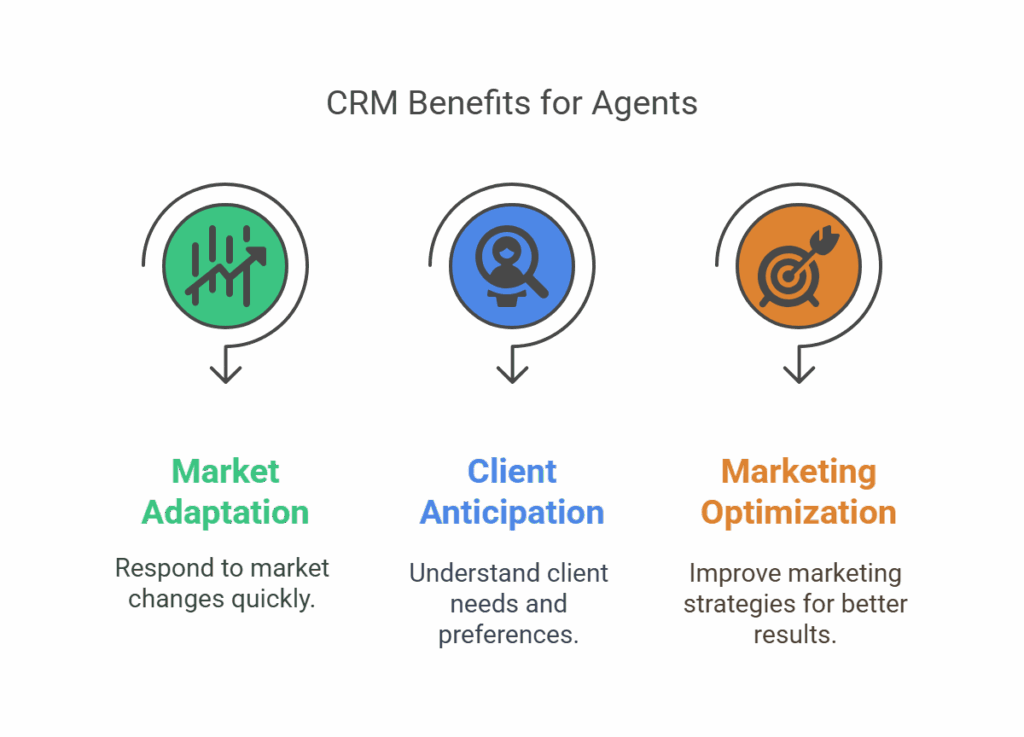In today’s competitive real estate market, professionals are constantly seeking ways to stay ahead. One highly effective strategy is leveraging real estate analytics software alongside CRM analytics. These tools help agents forecast sales, identify market trends, and quickly adapt to industry shifts. By combining CRM analytics with real estate analytics software, professionals can convert raw data into actionable insights, leading to smarter planning and more informed decision-making.
This blog post will explore how CRM analytics, supported by the power of real estate analytics software, can empower real estate agents by uncovering key sales forecasts and emerging market trends. Let’s dive into the potential of these tools in refining your strategy and optimizing overall performance.
Understanding CRM Analytics and Its Importance in Real Estate
CRM analytics is about examining the data in your customer relationship management system. It's a powerful tool for understanding and predicting business outcomes. For real estate agents, CRM analytics are invaluable. They offer insights that go beyond basic metrics, providing a detailed view of business operations.
Through no-code data dashboards, agents can track several key data points:
- Lead Conversion Rates: These indicate how effectively leads turn into clients, helping refine marketing strategies.
- Property Views Tracking: Track how often properties are viewed to highlight interest levels and potential demand. A CRM for property listings gives you real-time insights into which listings are attracting the most attention.
- Inquiry Trends: Monitoring inquiries can reveal client preferences and seasonal peaks.
- Deal Pipeline Stages: Understanding the stages of deals can help identify bottlenecks and improve process efficiency.
Making sense of these data points empowers real estate professionals to enhance their strategic decision-making. With a clear CRM Integration Solution, agents can forecast sales, identify trends, and plan better for the future.
Key Data Points for Forecasting Sales and Market Trends
CRM analytics can illuminate valuable insights through key data points. Here's how these metrics are essential for forecasting sales and understanding market dynamics in real estate:
- Lead Conversion Rates: This metric shows the percentage of leads that become clients. Tracking conversion rates helps you assess and refine your marketing strategies to be more effective.
- Property Views: Tracking the number of views each property receives helps determine interest levels. It allows agents to predict possible future demand based on visibility and engagement.
- Inquiry Trends: Monitoring inquiries over different time frames can highlight peak seasons. It also provides insights into client preferences and behavior, essential for targeting messages and planning campaigns.
- Deal Pipeline Stages: Analyzing the stages within your deal pipeline lets you spot bottlenecks or inefficiencies. By understanding this flow, agents can optimize their processes, paving the way for smoother transactions.
Using these data points, real estate agents can forecast sales with greater accuracy and identify emerging market trends. This proactive approach helps in adjusting strategies to meet the evolving needs of clients and the industry.
How Agents Can Benefit from CRM Insights
CRM analytics offer a goldmine of information, enabling real estate professionals to significantly enhance their business strategies. When combined with real estate analytics software, these insights empower agents to tailor their approaches for both lead generation and deal closure, helping them stay competitive in a dynamic market environment.
Here’s how agents can make the most of insights from CRM and real estate analytics software:
- Adapting to Market Changes: With real-time data at their fingertips, agents can swiftly respond to market fluctuations. This agility allows them to stay ahead of trends and shifts, maintaining a competitive advantage.
- Anticipating Client Needs: CRM analytics provide a deeper understanding of client behaviors and preferences. By leveraging this information, agents can predict client requirements and offer targeted, personalized service.
- Optimizing Marketing Efforts: Insights from CRM analytics help fine-tune marketing strategies. Agents can direct resources more effectively, focusing efforts on methods that yield the best results.
Through these strategic enhancements, real estate professionals can improve their overall effectiveness and achieve superior results. Harnessing CRM analytics is not just about data collection; it's about translating that data into smarter decisions and better outcomes.
Setting Up Effective Dashboards within CRM Systems
To truly harness the power of CRM analytics, it's crucial to set up effective dashboards and reports. These tools help visualize important data and metrics, making it easier to track and analyze trends over time. Real estate analytics software enhances this process by offering customizable, user-friendly interfaces tailored for property professionals. Here’s a simple guide to setting up dashboards effectively:
- Identify customizable reporting dashboards: begin by selecting the metrics that matter most to your business. Focus on KPIs that align with your goals and reflect current market trends. This keeps your analysis relevant and goal-oriented.
- Customization: Customize your dashboards to emphasize the data points vital for real estate forecasting. Tailor the interface to highlight the information you need to make informed decisions quickly.
- Automation and Alerts: Implement real-time calendar sync and set up alerts for significant data changes. This ensures you can act immediately when unusual patterns or opportunities arise, keeping you responsive and proactive.
By efficiently using CRM systems to create dashboards, agents can streamline their workflows and enhance data visibility. This leads to better-informed decisions, allowing agents to optimize their strategies and improve overall performance.
Conclusion
In the ever-changing landscape of real estate, the ability to anticipate and adapt is key to success. Real estate analytics software, combined with CRM analytics, provides the insights needed to stay ahead—making sales forecasting more accurate and trend analysis more comprehensive. By utilizing customizable dashboards within this software, professionals can enhance their agility and remain proactive in the face of market shifts. This strategic approach not only strengthens their position but also deepens their understanding of real estate market dynamics.
Fuzen stands out as a powerful ally in this journey. With its no-code solutions, you can build a robust, customized system without any coding expertise. Fuzen ensures agility, so your real estate operations can grow and adapt as needed, all while keeping costs in check.
FAQs
1. What is CRM analytics in real estate?
CRM analytics in real estate refers to analyzing customer relationship data to uncover trends, improve lead management, and optimize marketing strategies. It helps agents understand client behavior, track property interest, and make data-driven decisions for better sales outcomes.
2. How does real estate analytics software help agents forecast sales?
Real estate analytics software processes data like property views, inquiry trends, and lead conversion rates to help agents predict future sales. By identifying patterns and market shifts, agents can make more accurate forecasts and improve planning strategies.
3. What are the key CRM metrics real estate professionals should track?
Key CRM metrics include lead conversion rates, property views, inquiry volume, and deal pipeline stages. Monitoring these KPIs helps real estate professionals refine their approach, improve efficiency, and stay aligned with client needs and market demand.
4. Can I set up real estate dashboards without coding experience?
Yes, with no-code platforms like Fuzen, you can build customized dashboards without any coding skills. These tools allow real estate agents to visualize data, track key metrics in real time, and receive alerts for quick decision-making.
5. Why is combining CRM analytics with real estate analytics software important?
Combining both tools gives agents a complete view of client interactions and market dynamics. This synergy enables smarter lead generation, better sales forecasting, and more personalized service—crucial for staying competitive in today’s real estate market.

Pushkar is a seasoned SaaS entrepreneur. A graduate from IIT Bombay, Pushkar has been building and scaling SaaS / micro SaaS ventures since early 2010s. When he witnesses the struggle of non technical micro SaaS entrepreneurs first hand, he decided to build Fuzen as a nocode solution to help these micro SaaS builders.




